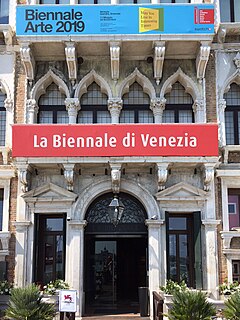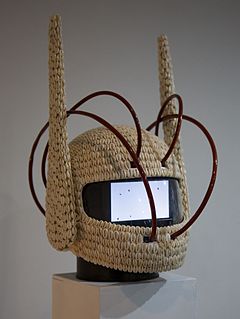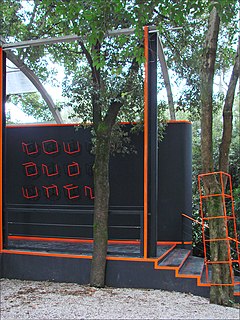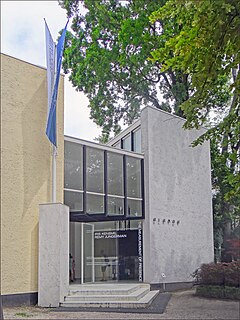
The Venice Biennale is an international cultural exhibition hosted annually in Venice, Italy by the Biennale Foundation. The biennale has been organised every year since 1895, which makes it the oldest of its kind. The main exhibition held in Castello, in the halls of the Arsenale and Biennale Gardens, alternates every second year between art and architecture. The other events hosted by the Foundation - spanning theatre, music, and dance - are held annually in various parts of Venice, whereas the Venice Film Festival takes place at the Lido.

Biennale, Italian for "biennial" or "every other year", is any event that happens every two years. It is most commonly used within the art world to describe large-scale international contemporary art exhibitions. As such the term was popularised by Venice Biennale, which was first held in 1895. Since the 1990s, the terms "biennale" and "biennial" have been interchangeably used in a more generic way - to signify a large-scale international survey show of contemporary art that recurs at regular intervals but not necessarily biannual. The phrase has also been used for other artistic events, such as the "Biennale de Paris", "Kochi-Muziris Biennale", Berlinale and Viennale.
The Biennale of Sydney is an international festival of contemporary art, held every two years in Sydney, Australia. It is a large and well-attended contemporary visual arts event in the country. Alongside the Venice and São Paulo biennales and Documenta, it is one of the longest running exhibitions of its kind and was the first biennale to be established in the Asia-Pacific region.

An arts festival is a festival that can encompass a wide range of art forms including music, dance, film, fine art, literature, poetry and isn't solely focused on visual arts. Arts festivals may feature a mixed program that include music, literature, comedy, children's entertainment, science, or street theatre, and are typically presented in venues over a period of time ranging from as short as a day or a weekend to a month. Each event within the program is usually separate.

The Singapore Biennale is a large-scale biennial contemporary art exhibition in Singapore, serving as the country’s major platform for international dialogue in contemporary art. It seeks to present and reflect the vigour of artistic practices in Singapore and Southeast Asia within a global context, fostering collaboration and engagement between artists, arts organisations, and the international arts community.
The Singapore Art Show was a biennial festival for visual art in Singapore, first organised by the National Arts Council in 2005 as a platform for local artists and Singaporeans. The Singapore Art Show was planned to be held on alternating years with the Singapore Biennale. The Art Show had a national focus on Singaporean and Singapore-based artists, while the Singapore Biennale, launched in 2006, would have a broader scope of Southeast Asian contemporary art in the international sphere. Instead of having a single theme like the Biennale, the Art Show had sought to feature a large number of exhibitions by local artists without an overarching curatorial theme.

Simon Njami is a writer and an independent curator, lecturer, art critic and essayist.

Vanessa Branson is an English entrepreneur and the founder of the Marrakech Biennale.
James Webb is a South African artist best known for his interventions and installations incorporating sound. Webb also works as a sound designer, curator and teacher. His sound installations place special emphasis on the sourcing and presentation of the sound clips, as well as the social significance and context of these sounds. Often referred to as a "collector of sounds," Webb is interested in the role that aural events play in our everyday life. The physical presentation of the work, including the installation space and the logistics of speakers, are also deliberate choices for Webb.

Emo de Medeiros is a Beninese artist living and working in Paris, France and in Cotonou, Benin.

The German pavilion houses Germany's national representation during the Venice Biennale arts festivals.

The Australian pavilion houses Australia's national representation during the Venice Biennale arts festivals.

The Belgian pavilion houses Belgium's national representation during the Venice Biennale arts festivals.

The Spanish pavilion houses Spain's national representation during the Venice Biennale arts festivals.

The Serbian pavilion houses Serbia's national representation during the Venice Biennale arts festivals.

The Polish pavilion houses Poland's national representation during the Venice Biennale arts festivals.

The Japanese pavilion houses Japan's national representation during the Venice Biennale arts festivals.

The Dutch pavilion houses the Netherlands's national representation during the Venice Biennale arts festivals.

The Finnish pavilion houses Finland's national representation during the Venice Biennale arts festivals.
The Danish pavilion houses Denmark's national representation during the Venice Biennale arts festivals. The building was designed by Carl Brummer and constructed between 1930 and 1932, and restored and expanded by Peter Koch in the 1950s.

















